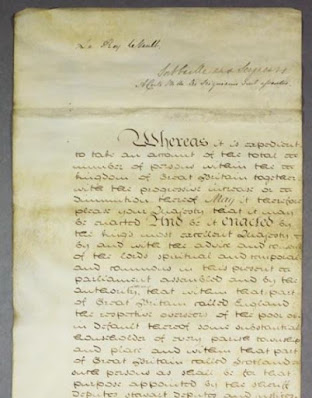University of Strathclyde - Genealogy Researching your Family Tree Course.
I did this course online at the same time that I did the Uni of Tas. course. It consists of videos and written material and short quizes at the end of each week. Along the way there are comments from others and the opportunity to add your own. A case study is used to illustrate the various weeks work.
Week 1 Intro and Analysing Documents.
The computer flow, and comments section were very easy, and there is some interaction with other people on the course. I particularly found the videos were very professionally done. There was nothing that the learner actually produced at the end, but for me this was not an issue, I will take from it what I need.
I liked that at the end of each article there was a list of links - very useful for later.I particularly have used the Genealogical Proof Standard section to help me sort out one of my Zealeys, but was not so interested in the DNA bit! If you want to do more with the Uni of Strathclyde then the MSc in Genealogical Palaeographic and Heraldic Studies. would be for you, but of course it does cost.
Comparing the two courses, I would say that if you are not computer savy the Strathclyde course is easier to do, the Uni Tas course seemed a bit too long, but it had more interaction between the participants. The Uni of Strathclyde course makes you apply the concepts to your own research. The UTas course guides the participant more, aimed at producing the research report at the end. Personally, I would do both! I've signed up for a couple of other courses on futurelean.com (not to do with family history).
- Advice for those new to family history.
- What is evidence
- Primary vs secondary sources
- Understanding the issues with a particular source
- Transcriptions vs index etc.
- Whats online
Week 2 Effective Searching Techniques
- How to create a research plan and what an effective search looks like.
- Different ways to approach research: FAN/cluster techniques and mind mapping
- Getting to grips with spelling and name change issues
- What primary source databases are and how get the best out of searching them, including wildcards.
Week 3 Using Major Source Types
- civil, church, census and military records.
- Primary records, and what they contain, how to use them
- Local Archives
- A review of major international and some more local and specialised database.
Week 4 Genealogical Proof and DNA Testing
- The principles of the Genealogical Proof Standard
- How to establish proof
- How to evaluate evidence
- An introduction to genetic genealogy with some case studies on using it to break down brick walls.
Week 5 Putting your Research into Context
- Useful types of secondary sources: local histories, ‘regular’ books on history, historical magazines, film, etc.
- Other sources of context: newspapers, maps, images
- How to assess the quality of these types of sources
- Finding these sources; useful online databases.
Week Six Documenting and Communicating your Research Results and Sources
- Storing, tracking and analysing data
- Software and charts
- Protecting your records
- Referencing
- Sharing your information
My Thoughts ....
This course is free and done online. The course seemed to me to have more academic rigor in its content than the one I did with UTAS. It required more independent thinking. It could be completed by a novice, but I think it is more suited to someone with a little experience.The computer flow, and comments section were very easy, and there is some interaction with other people on the course. I particularly found the videos were very professionally done. There was nothing that the learner actually produced at the end, but for me this was not an issue, I will take from it what I need.
I liked that at the end of each article there was a list of links - very useful for later.I particularly have used the Genealogical Proof Standard section to help me sort out one of my Zealeys, but was not so interested in the DNA bit! If you want to do more with the Uni of Strathclyde then the MSc in Genealogical Palaeographic and Heraldic Studies. would be for you, but of course it does cost.
Comparing the two courses, I would say that if you are not computer savy the Strathclyde course is easier to do, the Uni Tas course seemed a bit too long, but it had more interaction between the participants. The Uni of Strathclyde course makes you apply the concepts to your own research. The UTas course guides the participant more, aimed at producing the research report at the end. Personally, I would do both! I've signed up for a couple of other courses on futurelean.com (not to do with family history).



Comments
Post a Comment
Thank you for your comment on my Blog. I love to get feedback and information to share from my readers.
To keep up to date simply follow me on facebook or subscribe using the button at the top of the blog page.
Barb